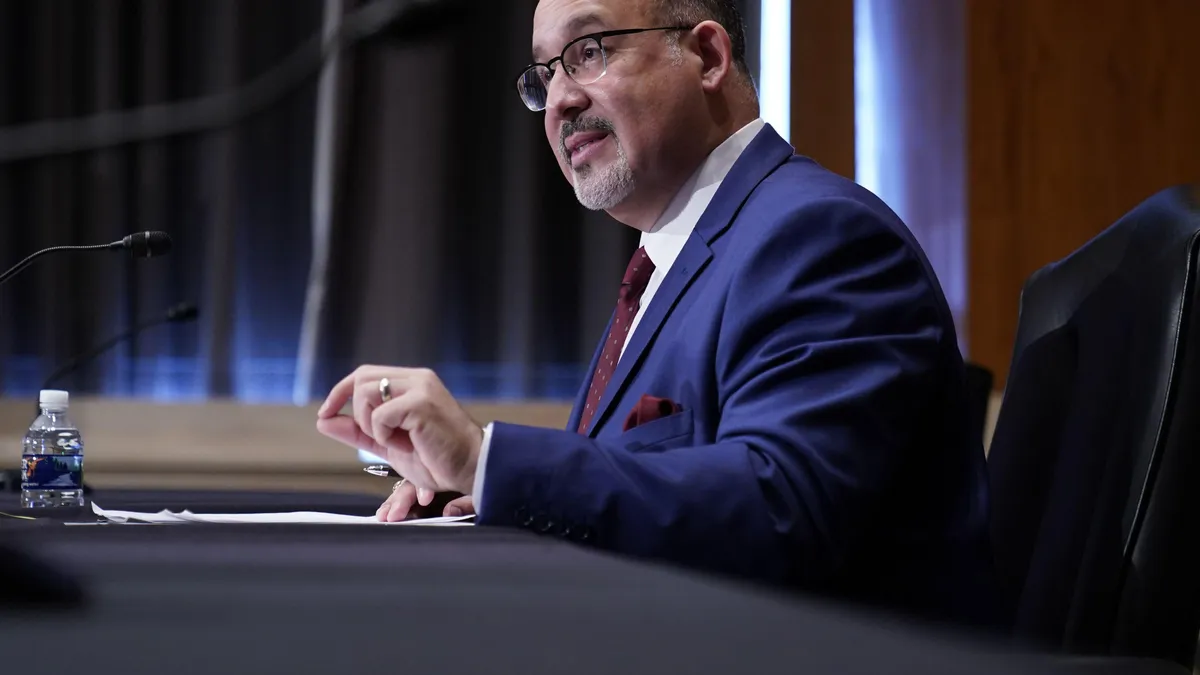UPDATE: March 1, 2020: The U.S. Senate confirmed Secretary of Education Miguel Cardona in a 64-33 vote Monday. Prior to the vote, Senators cited Cardona's dedication to public schools, his experience as an English language learner and an advocate for marginalized students, and recognition of the urgency of reopening schools.
Dive Brief:
-
In a Senate committee hearing Wednesday morning, legislators highlighted education secretary nominee Miguel Cardona's efforts to advocate for marginalized students throughout his career, as well as his ability to listen and build consensus as a leader.
-
In answering questions from lawmakers during the Health, Education, Labor and Pensions committee hearing, Cardona highlighted the need to reopen schools and said he would work to increase surveillance testing and prioritize educators for vaccinations.
-
Cardona also voiced support for transgender students' participation in school activities — calling it the "legal responsibility" of schools to protect all students' civil rights — and supported reducing exclusionary disciplinary practices, both notable contrasts to the previous administration's revocation on Obama-era guidance on these issues.
Dive Insight:
During the hearing, Sen. Patty Murray, the Democratic chair of the Health, Education, Labor and Pensions committee, highlighted Cardona's experience as a former elementary school teacher, adjunct professor, principal and assistant superintendent. Sen. Richard Burr, a Republican from North Carolina, also voiced his support for the nominee. The bipartisan reception of Cardona indicated lawmakers would move forward quickly with his confirmation.
Cardona's longstanding experience as an educator diverges from that of his predecessor, former Secretary of Education Betsy DeVos, who was criticized by the Democratic party and by educators for her lack of experience in public education. Biden's pick for education secretary was most recently Connecticut’s Commissioner of Education, a position he held since August 2019.
In a chat with members of the Education Writers Association this week, Rep. Bobby Scott (D-VA) said Cardona had "a very strong background on advocating for the elimination of achievement gaps." In 2011, Cardona served as co-chair of Connecticut's Achievement Gap Taskforce, which recommended rethinking school funding formulas, requiring that school districts provide school readiness programs to all eligible children as well as full-day kindergarten for every child, and putting in place culturally relevant materials for English learners.
Cardona, once an English learner himself, said during the hearing he would ensure the education system is "a door to opportunity" and an "equalizer for every student."
In 2013, Cardona also participated in an effort to improve union-district relations between Meriden Public Schools, where Cardona served as an educator and assistant superintendent, and its teachers union. He supported a "unified approach" between teachers and districts to increase student achievement, according to the American Federation of Teachers.
As the U.S. education secretary, Cardona will face the challenging task of reopening schools during the COVID-19 pandemic. Under his leadership, Connecticut reopened half of its school districts for full in-person learning, as of late January.
Sen. Chris Murphy, a Democratic lawmaker from Cardona's home state of Connecticut, said during the hearing that Cardona pushed to reopen schools before most people thought the undertaking possible, but that he did it in a way that didn't divide parents and teachers as a result of his "unique talent for consensus-building."
During the hearing, Cardona said he created system of communication, relied heavily on science and created partnerships to reopen Connecticut's schools. He said he would "bring that same mentality of partnership and clear communication" to the Education Department.
In one of Cardona's first interviews following his nomination, he told Connecticut Public Radio that he doesn't think reopening should be a national or state decision, but rather one that should be made in "very close partnership" with local state officials.
When asked if he would consider a national summer school program, which has been implemented by other nations to address pandemic-induced learning loss, Cardona didn't directly answer. Instead, he said his role will be to "support states" and provide guidance.
"Obviously we need to learn from best practices as well," he said during the hearing. "I think one of the roles that we can have at the federal level is to share best practices throughout our country — remove those silos and remove those barriers of innovation, communication right?"
He suggested extended learning and summer programs as possible best practices, but also stressed social emotional learning as an important aspect to consider.
Cardona is not yet confirmed, and the Senate committee must first vote on his nomination before passing it on for a full Senate vote. Murray said she would try to set a committee vote "as quickly as possible." The full Senate has not set a date for Cardona's confirmation.











